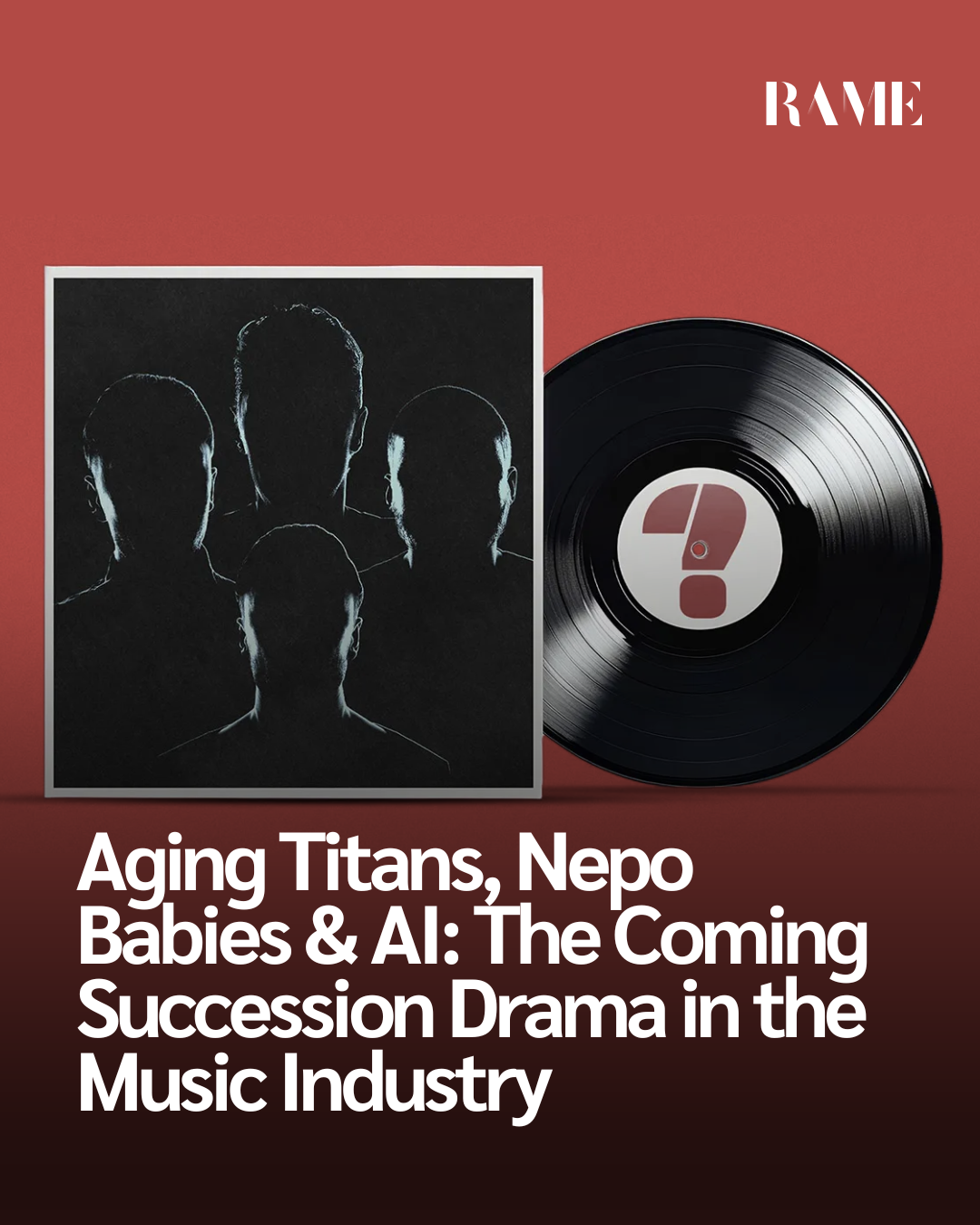The music industry has long been a world where personal connections, dynasties, and insider access determine who climbs to the top. Now, as artificial intelligence looms over every sector, the world’s major record labels Universal Music Group (UMG), Warner Music Group (WMG), and Sony Music Group find themselves at a pivotal crossroads: who’s taking the reins next?
With 84% of the global recorded music market controlled by these three giants, the question of succession is more than idle speculation. It’s a sign of how an evolving industry shaped by tech disruption, Gen Z audiences, and streaming-driven marketing might be led into the future by a new generation of executives, some of whom happen to be the children of the old guard.
The Rise of the “Nepo Execs”
Leading the parade of so-called “nepo babies” is Elliot Grainge, son of UMG’s long-standing CEO Lucian Grainge. Elliot made his name in the indie circuit, notably through 10K Projects, a label he founded that found success with breakout acts like Ice Spice and 6ix9ine. Warner Music bought a majority stake in 10K in 2023, and by late 2024, Elliot, at 30, was brought in to revive Warner’s Atlantic Records.
Once commanding 10% of market share in 2020, Atlantic had dropped to 5.7% by 2023. Elliot’s digital-first approach, built on TikTok-savvy instincts and influencer-driven A&R, is now being tested at a much larger scale.
Elliot isn’t alone. WMG’s billionaire owner Len Blavatnik has his own 27-year-old son, Val Blavatnik, positioned on the board and making increasingly public moves at the company. The proximity and closeness of the two young men both heirs apparent in some form hasn’t gone unnoticed.
“This has always been a dynastic play for Len and Val,” one insider told The Hollywood Reporter. Another speculates that Elliot’s presence is a grooming strategy for Val’s future role. In short: this could be music’s version of Succession, only real, and with viral songs instead of stock options.
A CEO in Question
Caught in the middle of all this speculation is Robert Kyncl, WMG’s current CEO, who joined from YouTube in 2022. With a tech and media background but no real music business pedigree, Kyncl has faced scrutiny from day one. His tenure has included both strategic modernization and mixed financial performance WMG’s stock is down 16% year over year, and Q1 earnings in 2025 failed to wow investors.
Yet ironically, if AI is the future of music production, marketing, and discovery, Kyncl may be uniquely qualified to lead that charge. A digital native in a field dominated by aging, analog-bred executives, Kyncl is either ahead of his time or entirely misplaced depending on who you ask.
Despite rumors swirling about his potential exit, WMG insists Kyncl isn’t going anywhere. Still, insiders remain unconvinced. As one artist manager bluntly put it, “Len will throw his kid in the seat as fast as he can.”
The Universal Equation
While eyes remain fixed on Warner’s unfolding drama, Universal the largest of the three majors faces its own long-term question: what happens when Lucian Grainge steps down?
Grainge, who has helmed UMG since 2011, was the architect behind the label’s monumental acquisition of EMI in 2012, right as Spotify entered the U.S. market. UMG now controls two-thirds of the global music catalog. His reign has seen streaming become king, major IPOs, and digital transformations that set industry-wide standards.
But Grainge’s contract ends in May 2028. While no exit plans are official, succession has reportedly been discussed at the board level. The idea of choosing someone from outside the UMG ecosystem has been scoffed at insiders expect the next leader to rise from within.
Potential candidates include Monte Lipman, CEO of Republic Records, and John Janick, the widely respected chief of Interscope. Both are veterans with long-standing ties to the company, and both have managed high-impact rosters. But international executives and emerging leaders are also being groomed quietly, creating a deep bench of internal contenders.
The Sony Factor
Sony Music, helmed by Rob Stringer since 2017, has quietly built a formidable run with megastars like Adele, Beyoncé, Tyler, the Creator, and Harry Styles. Stringer’s success is partly due to his lifelong tenure with Sony, having risen through the ranks the traditional way. While no immediate shake-up is rumored, the broader question remains: is the next wave of label leadership ready and diverse enough?
Where Are the Women?
That question brings us to a major fault line in the industry’s leadership pipeline: gender equity.
In recent years, there were encouraging signs of change Michelle Jubelirer (Capitol), Julie Greenwald (Atlantic), Ethiopia Habtemariam (Motown), and Sylvia Rhone (Epic) had broken barriers at the highest levels. But today, only Rhone remains and at 73, she may be nearing retirement.
On the publishing side, women fare slightly better: Jody Gerson continues to lead Universal Music Publishing Group, and Carianne Marshall has held the COO post at Warner Chappell since 2018. Still, the top label seats are once again largely occupied by white men, a fact not lost on frustrated female executives.
“It’s pretty pathetic,” says one veteran. “The industry hasn’t groomed women for these roles. With the backlash to DEI initiatives, it’s like everyone now has permission to just hire another average white guy.”
Next-Gen Hopes
Despite concerns, there are green shoots of change. Across all three majors, young, diverse leaders are emerging:
- At UMG’s Island Records, Imran Majid and Justin Eshak were made co-CEOs in 2021.
- Tunji Balogun took over Def Jam as CEO in 2022.
- Tyler Arnold, just 32, became chairman and CEO of Mercury in March 2025.
- Clio Massey, daughter of Arista founder David Massey, has been appointed co-president of the label.
- At Warner Records, Aaron Bay-Schuck (age 43) has overseen some of WMG’s most consistent recent hits, including artists like Zach Bryan and Teddy Swims.
These appointments reflect a slow but real transition toward a more modern, digital-native, and potentially more inclusive music industry. But the nepo factor still casts a long shadow especially when the new faces at the top carry the same last names as the old ones.
The AI Wildcard
Hovering over all of this is AI the next technological revolution in music. Whether it’s AI-assisted songwriting, synthetic vocals, or predictive analytics, the very nature of music creation and consumption is about to change. How labels adapt and who leads that adaptation will determine the winners and losers of the next decade.
Oddly enough, this future may favor executives like Robert Kyncl the very kind many insiders want to oust. If succession is about positioning the right leader for tomorrow’s challenges, then picking familiar names based on legacy alone could be the industry’s greatest liability.
Final Chorus: Same As the Old Chorus?
Music, at its core, is about hits. No matter how high-level the boardroom drama gets, a streak of global smashes can shift the narrative in a matter of weeks. As of now, WMG has five of the top 10 songs on Spotify’s Global 50 that’s a powerful card to hold.
But the industry’s real succession story isn’t just about who takes over. It’s about whether the business can break free from the habits of its past, embrace real diversity, and prepare for a future where technology, youth, and innovation set the beat.
As one long-time executive put it: “In music, it’s like, ‘Oh well, we’re fucking morons.’ Time and time again, these CEOs refuse to leave or to do what’s right. It’s like we’re trapped in a loop.”
And in the background? The same song plays on just maybe with a new remix.



